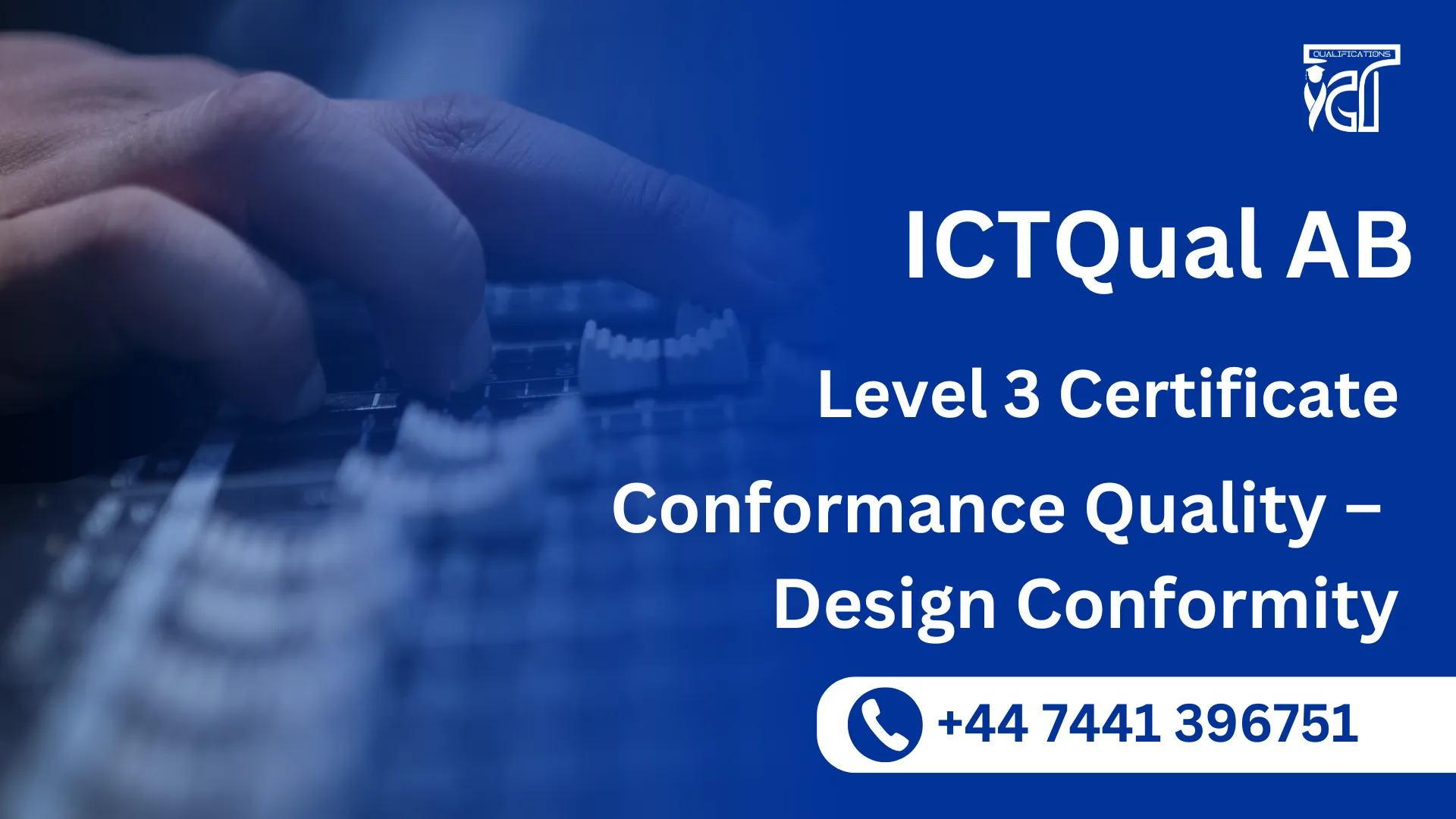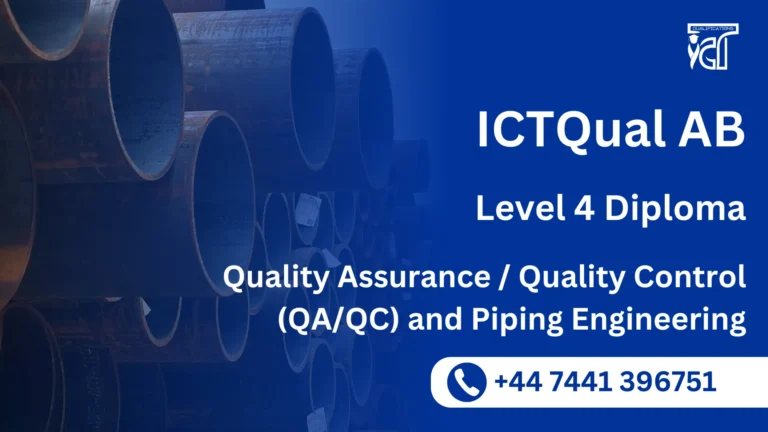The ICTQual AB Level 3 Certificate in Conformance Quality – Design Conformity is developed to provide learners with the essential knowledge and skills required to ensure that products, systems, and processes meet established design specifications and industry standards. This qualification emphasizes the importance of design conformity as a foundation for quality assurance, compliance, and customer satisfaction.
Design conformity plays a critical role in safeguarding product reliability, operational efficiency, and regulatory compliance. Learners are introduced to the principles of design validation, specification adherence, and conformity assessment, gaining insight into how these practices prevent defects, reduce risks, and support organizational excellence. The course highlights the link between design conformity and broader quality management frameworks.
The curriculum combines theoretical learning with practical application. Participants explore topics such as design review techniques, conformity assessment methods, documentation standards, and corrective action planning. Case studies and industry examples allow learners to apply design conformity practices in real‑world scenarios, strengthening their ability to contribute to QA/QC teams and compliance monitoring activities.
Upon completion, learners will be equipped to support organizations in maintaining high standards of quality by ensuring that designs are implemented accurately and consistently. The certificate enhances employability in manufacturing, engineering, and industrial sectors, while also providing a pathway to advanced qualifications in quality management and design assurance. By mastering design conformity practices, participants contribute to building trust, consistency, and excellence across industries.
ICTQual AB Level 3 Certificate in Conformance Quality – Design Conformity
This qualification, the ICTQual AB Level 3 Certificate in Conformance Quality – Design Conformity, consists of 3 mandatory units.
| Sr# | Unit Title |
| 1 | Design Conformity Principles and Quality Standards |
| 2 | Design Evaluation and Verification Processes |
| 3 | Continuous Improvement in Design Quality |
Learning Outcomes for the ICTQual AB Level 3 Certificate in Conformance Quality – Design Conformity:
Design Conformity Principles and Quality Standards
- Learners will understand the key principles of design conformity within quality management frameworks.
- Learners will identify and interpret international standards and regulatory requirements related to design assurance.
- Learners will develop knowledge of how design specifications influence product performance and compliance.
- Learners will understand the role of quality systems in maintaining design accuracy and consistency.
- Learners will recognise the importance of documentation, traceability, and validation in design processes.
- Learners will gain awareness of ethical and safety considerations in design conformity management.
- Learners will analyse how design quality contributes to customer satisfaction and organisational success.
Design Evaluation and Verification Processes
- Learners will gain the ability to conduct systematic evaluations of product and process designs.
- Learners will understand verification and validation techniques used to assess conformity to design specifications.
- Learners will apply analytical and testing methods to identify non-conformities in design outputs.
- Learners will develop competence in interpreting data from design trials, prototypes, and inspections.
- Learners will understand how to prepare and maintain detailed design evaluation records and reports.
- Learners will learn to collaborate effectively with design, production, and quality teams during verification stages.
- Learners will gain the ability to recommend corrective actions and improvements based on evaluation findings.
Continuous Improvement in Design Quality
- Learners will understand how feedback and performance analysis support ongoing design improvement.
- Learners will apply quality tools and methodologies to enhance the design process and prevent non-conformance.
- Learners will develop the ability to identify improvement opportunities through audit and review mechanisms.
- Learners will understand the integration of continuous improvement principles within the design life cycle.
- Learners will gain insight into data-driven decision-making for optimising design performance.
- Learners will learn to promote a culture of innovation, accountability, and quality excellence in design environments.
- Learners will demonstrate an understanding of how design improvements contribute to organisational competitiveness and global standards compliance.
The ICTQual AB Level 3 Certificate in Conformance Quality – Design Conformity equips learners with the skills to ensure that products, systems, and processes meet established design specifications and industry standards. This qualification highlights the importance of design conformity in achieving compliance, efficiency, and customer satisfaction.
Knowledge and Understanding
- Builds a strong foundation in design conformity principles and quality assurance frameworks
- Provides insight into how design validation supports compliance and product reliability
- Enhances understanding of documentation, reporting, and corrective action processes
- Develops awareness of international standards and industry requirements related to design conformity
- Strengthens knowledge of design review and conformity assessment methods
Practical Skills Development
- Equips learners to conduct design conformity checks with accuracy and consistency
- Improves ability to identify, record, and resolve design‑related non‑conformities
- Provides training in design review techniques, specification adherence, and corrective action planning
- Encourages application of conformity assessment results to support continuous improvement initiatives
- Enhances competence in supporting QA/QC teams with reliable design validation data
Career and Progression Opportunities
- Opens pathways to roles such as Design Conformity Technician, Quality Inspector, or Compliance Assistant
- Enhances employability in industries including manufacturing, engineering, automotive, and industrial services
- Serves as a stepping stone toward higher‑level diplomas in QA/QC and design assurance disciplines
- Provides a recognized credential valued by employers worldwide
- Supports career growth by aligning skills with organizational excellence and customer satisfaction
Contribution to Organizational Success
- Enables professionals to strengthen product integrity and operational efficiency through design conformity
- Promotes efficiency by preventing costly errors and reducing risks in production and service delivery
- Supports organizations in maintaining compliance with industry standards and specifications
- Encourages a culture of precision, accountability, and continuous improvement
- Contributes to customer trust and satisfaction through consistent quality outcomes
The ICTQual AB Level 3 Certificate in Conformance Quality – Design Conformity is tailored for individuals who want to develop practical skills in ensuring that products, systems, and processes meet established design specifications and industry standards. The ideal learner is someone motivated to contribute to quality assurance, compliance, and organizational improvement through precision and accountability.
Professional Background
- School leavers or beginners seeking entry into the QA/QC field
- Early‑career professionals working in manufacturing, engineering, automotive, or industrial environments
- Individuals employed in inspection, production, or maintenance roles who want formal training in design conformity
- Employees transitioning into compliance or quality assurance functions
- Candidates aiming to strengthen employability with a recognized technical qualification
Skills and Interests
- Interested in learning how design conformity supports compliance, efficiency, and customer satisfaction
- Keen to develop practical skills in design review, specification adherence, and documentation
- Motivated to understand international standards and industry requirements
- Curious about applying conformity assessment methods to real‑world scenarios
- Committed to improving accuracy, reliability, and continuous improvement in their work
Career Aspirations
- Aspiring to progress into roles such as Design Conformity Technician, Quality Inspector, or Compliance Assistant
- Seeking career advancement opportunities in manufacturing, engineering, automotive, or industrial services
- Looking to build a pathway toward higher‑level diplomas in QA/QC and design assurance disciplines
- Interested in contributing to organizational excellence and customer trust
- Focused on aligning personal growth with industry standards and expectations
Personal Attributes
- Detail‑oriented and attentive to accuracy in inspection and reporting
- Responsible and committed to maintaining compliance with design conformity standards
- Open to learning through case studies, practical projects, and applied examples
- Collaborative, with the ability to work effectively in QA/QC teams
- Driven to contribute positively to organizational performance and continuous improvement
Completing the ICTQual AB Level 3 Certificate in Conformance Quality – Design Conformity provides learners with a strong foundation in ensuring that products, systems, and processes meet design specifications and industry standards. This qualification enhances employability and opens pathways for advanced study and career progression in quality assurance, design validation, and compliance disciplines.
Academic Progression
- Progression to ICTQual AB Level 4 Diplomas in QA/QC or design assurance disciplines
- Opportunity to specialize in advanced design validation, conformity assessment, or compliance auditing
- Access to higher‑level qualifications in quality management, industrial engineering, or process improvement
- Builds a pathway toward Level 5 and Level 6 diplomas in quality assurance and design conformity
- Provides a recognized credential supporting lifelong learning and professional development
Career Progression
- Entry into roles such as Design Conformity Technician, Quality Inspector, or Compliance Assistant
- Opportunities in industries including manufacturing, engineering, automotive, aerospace, and industrial services
- Ability to support QA/QC teams in design review, conformity assessment, and corrective action planning
- Enhanced employability for roles requiring knowledge of design standards and compliance frameworks
- Foundation for supervisory positions with further experience and advanced qualifications
Professional Development
- Strengthens analytical and technical skills needed for design conformity and reporting
- Encourages continuous improvement practices aligned with international quality standards
- Provides confidence to take on responsibilities in design validation, compliance monitoring, and defect prevention
- Builds transferable skills applicable across multiple technical and industrial sectors
- Supports career mobility both locally and internationally
Long‑Term Opportunities
- Pathway to senior QA/QC and design assurance roles with advanced study and industry experience
- Potential to move into specialized fields such as compliance auditing, product certification, or process optimization
- Opportunities to contribute to organizational excellence and customer satisfaction through design conformity
- Recognition as a professional committed to precision and adherence to design standards
- Foundation for leadership roles in quality management and industrial design assurance
Entry Requirements
Learners must meet the following criteria to be considered for admission into the course:
- Age Requirement: Learners must typically be 16 years of age or older at the time of enrolment
- Educational Background: Completion of secondary school education or equivalent qualification. Basic knowledge of technical or industrial processes is recommended but not mandatory
- Work Experience: No prior industry experience required, making the course accessible to beginners and school leavers. Candidates with exposure to production, inspection, or compliance roles will benefit from enhanced understanding
- English Language Proficiency: Competence in English (or the language of instruction) to participate effectively in coursework and assessments. Recommended proficiency at CEFR A2–B1 level or equivalent
Register Now
Qualification Process
Qualification Process for the ICTQual AB Level 3 Certificate in Conformance Quality – Design Conformity
- Self-Assessment:
Begin by evaluating your eligibility to ensure you meet the qualification requirements, including work experience, knowledge, and language proficiency. - Registration:
Complete your registration by submitting the required documents, including a scanned copy of a valid ID, and paying the registration fee. - Induction:
An assessor will conduct an induction to confirm your eligibility for the course and explain the evidence requirements. If you do not meet the criteria, your registration will be cancelled, and the fee will be refunded. - Assignments & Evidence Submission:
Provide all assignments and the necessary evidence based on the assessment criteria outlined in the course. If you are unsure of the required evidence, consult with the assessor for guidance on the type and nature of evidence needed. - Feedback and Revision:
The assessor will review your submitted evidence and provide feedback. Evidence that meets the criteria will be marked as “Criteria Met,” while any gaps will be identified. You will be asked to revise and resubmit if needed. - Competence Evidence:
Submit final evidence demonstrating that all learning outcomes have been met. This evidence will be marked as “Criteria Met” by the assessor once it is satisfactory. - Internal Quality Assurance (IQA):
The Internal Quality Assurance Verifier (IQA) will review your evidence to ensure consistency, quality, and compliance with standards. - External Verification:
The IQA will submit your portfolio to ICTQUAL AB External Quality Assurance Verifiers (EQA) for final confirmation. The EQA may contact you directly to verify the authenticity of your evidence. - Certification:
Upon successful completion of all checks, ICTQUAL AB will issue your official certificate, confirming that you have attained the ICTQual AB Level 3 Certificate in Conformance Quality – Design Conformity







